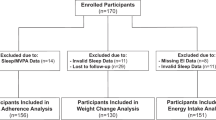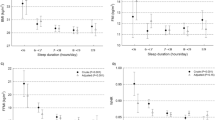Abstract
Background:
The LIFE study is a two-phase randomized clinical trial comparing two approaches to maintaining weight loss following guided weight loss. Phase I provided a nonrandomized intensive 6-month behavioral weight loss intervention to 472 obese (body mass index 30–50) adult participants. Phase II is the randomized weight loss maintenance portion of the study. This paper focuses on Phase I measures of sleep, screen time, depression and stress.
Methods:
The Phase I intervention consisted of 22 group sessions led over 26 weeks by behavioral counselors. Recommendations included reducing dietary intake by 500 calories per day, adopting the Dietary Approaches to Stop Hypertension (DASH) dietary pattern and increasing physical exercise to at least 180 min per week. Measures reported here are sleep time, insomnia, screen time, depression and stress at entry and post-weight loss intervention follow-up.
Results:
The mean weight loss for all participants over the intensive Phase I weight loss intervention was 6.3 kg (s.d. 7.1). Sixty percent (N=285) of participants lost at least 4.5 kg (10 lbs) and were randomized into Phase II. Participants (N=472) attended a mean of 73.1% (s.d. 26.7) of sessions, completed 5.1 (s.d. 1.9) daily food records/week, and reported 195.1 min (s.d. 123.1) of exercise per week. Using logistic regression, sleep time (quadratic trend, P=0.030) and lower stress (P=0.024) at entry predicted success in the weight loss program, and lower stress predicted greater weight loss during Phase I (P=0.021). In addition, weight loss was significantly correlated with declines in stress (P=0.048) and depression (P=0.035).
Conclusion:
Results suggest that clinicians and investigators might consider targeting sleep, depression and stress as part of a behavioral weight loss intervention.
This is a preview of subscription content, access via your institution
Access options
Subscribe to this journal
Receive 12 print issues and online access
$259.00 per year
only $21.58 per issue
Buy this article
- Purchase on Springer Link
- Instant access to full article PDF
Prices may be subject to local taxes which are calculated during checkout



Similar content being viewed by others
References
Ogden CL, Carroll MD, McDowell MA, Flegal KM, Division of Health Nutrition Examination Surveys. Obesity among adults in the United States—No statistically significant change since 2003–2004. 1. 2007. NCHS Data Brief 2007. vol. 1, pp 1–6. Ref Type: Report, http://www.cdc.gov/nchs/data/databriefs/db01.pdf.
Flegal KM, Carroll MD, Ogden CL, Curtin LR . Prevalence and trends in obesity among US adults, 1999–2008. JAMA 2010; 303: 235–241.
Haslam DW, James WP . Obesity. Lancet 2005; 366: 1197–1209.
Gangwisch JE, Malaspina D, Boden-Albala B, Heymsfield SB . Inadequate sleep as a risk factor for obesity: analyses of the NHANES I. Sleep 2005; 28: 1289–1296.
Vorona RD, Winn MP, Babineau TW, Eng BP, Feldman HR, Ware JC . Overweight and obese patients in a primary care population report less sleep than patients with a normal body mass index. Arch Intern Med 2005; 165: 25–30.
Taheri S, Lin L, Austin D, Young T, Mignot E . Short sleep duration is associated with reduced leptin, elevated ghrelin, and increased body mass index. PLoS Med 2004; 1: e62.
Spiegel K, Tasali E, Penev P, Van CE . Brief communication: Sleep curtailment in healthy young men is associated with decreased leptin levels, elevated ghrelin levels, and increased hunger and appetite. Ann Intern Med 2004; 141: 846–850.
Crespo CJ, Smit E, Troiano RP, Bartlett SJ, Macera CA, Andersen RE . Television watching, energy intake, and obesity in US children: results from the third National Health and Nutrition Examination Survey, 1988–1994. Arch Pediatr Adolesc Med 2001; 155: 360–365.
Janssen I, Katzmarzyk PT, Boyce WF, King MA, Pickett W . Overweight and obesity in Canadian adolescents and their associations with dietary habits and physical activity patterns. J Adoles Health 2004; 35: 360–367.
Tremblay MS, Willms JD . Is the Canadian childhood obesity epidemic related to physical inactivity? Int J Obes Related Metab Disorders: J Int Assoc Study of Obes 2003; 27: 1100–1105.
Pettee KK, Ham SA, Macera CA, Ainsworth BE . The reliability of a survey question on television viewing and associations with health risk factors in US adults. Obesity (Silver Spring) 2009; 17: 487–493.
Shields M, Tremblay MS . Screen time among Canadian adults: a profile. Health Rep 2008; 19: 31–43.
Weiss EC, Galuska DA, Kettel KL, Gillespie C, Serdula MK . Weight regain in U.S. adults who experienced substantial weight loss, 1999–2002. Am J Prev Med 2007; 33: 34–40.
Needham BL, Epel ES, Adler NE, Kiefe C . Trajectories of change in obesity and symptoms of depression: the CARDIA study. Am J Public Health 2010; 100: 1040–1046.
Onyike CU, Crum RM, Lee HB, Lyketsos CG, Eaton WW . Is obesity associated with major depression? Results from the Third National Health and Nutrition Examination Survey. Am J Epidemiol 2003; 158: 1139–1147.
Strine TW, Mokdad AH, Dube SR, Balluz LS, Gonzalez O, Berry JT et al. The association of depression and anxiety with obesity and unhealthy behaviors among community-dwelling US adults. Gen Hosp Psychiatry 2008; 30: 127–137.
Herva A, Laitinen J, Miettunen J, Veijola J, Karvonen JT, Läksy K et al. Obesity and depression: results from the longitudinal Northern Finland 1966 Birth Cohort Study. Int J Obes (Lond) 2006; 30: 520–527.
Luppino FS, de Wit LM, Bouvy PF, Stijnen T, Cuijpers P, Penninx BW et al. Overweight, obesity, and depression: a systematic review and meta-analysis of longitudinal studies. Arch Gen Psychiatry 2010; 67: 220–229.
Epel E, Lapidus R, McEwen B, Brownell K . Stress may add bite to appetite in women: a laboratory study of stress-induced cortisol and eating behavior. Psychoneuroendocrinology 2001; 26: 37–49.
Torres SJ, Nowson CA . Relationship between stress, eating behavior, and obesity. Nutrition 2007; 23: 887–894.
Gluck ME . Stress response and binge eating disorder. Appetite 2006; 46: 26–30.
Adam TC, Epel ES . Stress, eating and the reward system. Physiol Behav 2007; 91: 449–458.
Kyrou I, Tsigos C . Stress hormones: physiological stress and regulation of metabolism. Curr Opin Pharmacol 2009; 9: 787–793.
Hollis JF, Gullion CM, Stevens VJ, Brantley PJ, Appel LJ, Ard JD et al. Weight loss during the intensive intervention phase of the weight-loss maintenance trial. Am J Prev Med 2008; 35: 118–126.
Elder C, Gallison C, Lindberg N, Debar L, Funk K, Ritenbaugh CK et al. Randomized Trial of Tapas Acupressure for Weight Loss Maintenance: Rationale and Study Design. J Altern Complement Med 2010; 16: 683–690.
Funk KL, Elmer PJ, Stevens VJ, Harsha DW, Craddick SR, Lin PH et al. PREMIER—a trial of lifestyle interventions for blood pressure control: intervention design and rationale. Health Promot Pract 2008; 9: 271–280.
Bandura A . Social Foundations of Thought and Action: A Social Cognitive Theory. Prentice Hall: Englewood Cliffs, NJ, 1986.
Watson DLTR . Self-Directed Behavior: Self-Modification for Personal Adjustment. Brooks/Cole: Pacific Grove, CA, 1989.
Prochaska JO, DiClemente CC . Stages and processes of self-change of smoking: toward an integrative model of change. J Consult Clin Psychol 1983; 51: 390–395.
Miller WR, Rollnick S . Motivational Interviewing: Preparing People to Change Addictive Behavior. The Guildford Press: New York, 1991.
Bandura A, Adams N . Analysis of self-efficacy theory of behavioral change. Cogn Ther Res 1977; 1: 287–310.
Bastien CH, Vallieres A, Morin CM . Validation of the Insomnia Severity Index as an outcome measure for insomnia research. Sleep Med 2001; 2: 297–307.
Cohen S, Williamson GM . Perceived stress in a probability sample of the United States. Spacapan S and Oskamp S. The Social Psychology of Health 1988. Sage: Newbury Park, CA. Ref Type: Book Chapter.
Cohen S, Kamarck T, Mermelstein R . A global measure of perceived stress. J Health Soc Behav 1983; 24: 385–396.
Kroanke K, Spitzer RL . The PHQ-9: A new depression diagnostic and severity measure. Psychiatric Annals 2002; 32: 1–7.
Collins LM, Schafer JL, Kam CM . A comparison of inclusive and restrictive strategies in modern missing data procedures. Psychol Methods 2001; 6: 330–351.
Little RJ, Rubin DB . Statistical Analysis with Missing Data. John Wiley & Sons: New York, 2002.
Cota D, Tschop MH, Horvath TL, Levine AS . Cannabinoids, opioids and eating behavior: the molecular face of hedonism? Brain Res Rev 2006; 51: 85–107.
Wadden TA, Butryn ML, Wilson C . Lifestyle modification for the management of obesity. Gastroenterology 2007; 132: 2226–2238.
Acknowledgements
This work was funded by a grant (5R01AT003928) from The National Center for Complementary and Alternative Medicine, National Institutes of Health.
Author information
Authors and Affiliations
Corresponding author
Ethics declarations
Competing interests
The authors declare no conflict of interest.
Rights and permissions
About this article
Cite this article
Elder, C., Gullion, C., Funk, K. et al. Impact of sleep, screen time, depression and stress on weight change in the intensive weight loss phase of the LIFE study. Int J Obes 36, 86–92 (2012). https://doi.org/10.1038/ijo.2011.60
Received:
Revised:
Accepted:
Published:
Issue Date:
DOI: https://doi.org/10.1038/ijo.2011.60
Keywords
This article is cited by
-
Incorporating Skills for Managing Mood, Stress, and Sleep into a Gestational Weight Gain Intervention
Journal of Contemporary Psychotherapy (2023)
-
Effect of sleep on weight loss and adherence to diet and physical activity recommendations during an 18-month behavioral weight loss intervention
International Journal of Obesity (2022)
-
The association of stressful life events on weight loss efforts among African American breast cancer survivors
Journal of Cancer Survivorship (2022)
-
Sleep characteristics modify the associations of physical activity during pregnancy and gestational weight gain
Archives of Gynecology and Obstetrics (2022)
-
Can the relationship between overweight/obesity and sleep quality be explained by affect and behaviour?
Eating and Weight Disorders - Studies on Anorexia, Bulimia and Obesity (2022)



